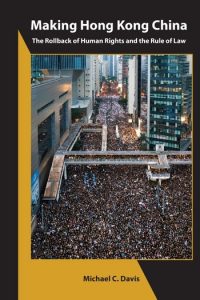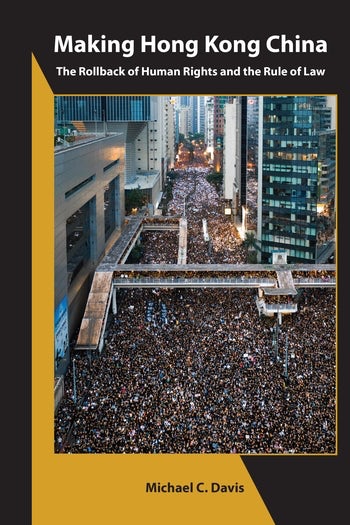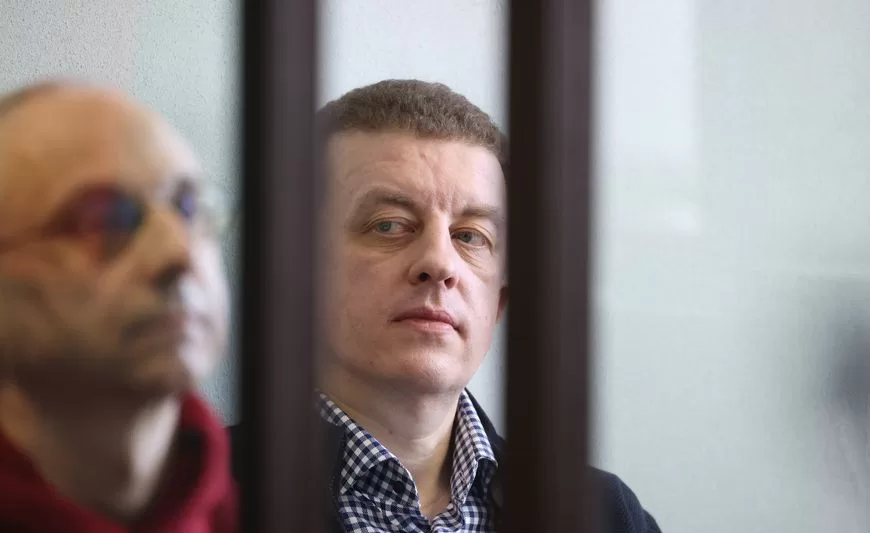[vc_row][vc_column][vc_column_text] In 2019, the world looked on as millions of ordinary Hongkongers took to the streets to protest a proposed extradition law and to demand democratic reform. People around the globe were witnessing a piece of this great city’s history and feeling every ripe emotion alongside Hong Kong’s determined protesters.
In 2019, the world looked on as millions of ordinary Hongkongers took to the streets to protest a proposed extradition law and to demand democratic reform. People around the globe were witnessing a piece of this great city’s history and feeling every ripe emotion alongside Hong Kong’s determined protesters.
That moment is where this narrative begins. It is the story of a city whose people, since the handover in 1997, have felt the full catalog of emotions inspired by the onslaught of authoritarianism—anxiety, hope, despair, trepidation, and fear. Anxiety has always been part of Hong Kong’s handover story. Hope rose both from the signing of the 1984 Sino-British Joint Declaration and the passage of the 1990 Hong Kong Basic Law, as well as from later widely-supported popular protests for political reform. Despair was fueled by Beijing’s ignoring of such popular demands. Trepidation stemmed from the violence on the streets and a worry that Beijing might respond with heavy-handed repression. Fear is what has now settled on the community.
One year after the protests began, and twenty-three years after the handover, 2020 has given way mostly to a level of fear, unseen before in Hong Kong, about the future. At the center of it all is anxiety about the arrest of anyone who might have once dared to speak up, brought on by the new national security law. Beijing’s direct intervention has exposed its profound distrust of Hong Kong’s institutions, as it installs various direct controls at all levels of the criminal justice process, including the executive, the police, the Justice Department, and the courts. This intervention has brought a chill to Hong Kong’s much vaunted rule of law, its dynamic press, its world-class universities, and its status as Asia’s leading financial center.
This chilling effect is especially dramatic because of Hong Kong’s long-established status as the freest economy in Asia and the world. This freedom, however, is not limited to economics: there are many dramatic distinctions between life in Hong Kong and life on the mainland. These differences have breathed a very distinct identity into Hong Kong, and they have driven the passions that have exploded in the Hong Kong protests.
In fact, it is this very freedom that China sought to preserve with the “one country, two systems” model embodied in the Joint Declaration and the Basic Law, which was enacted to carry out the 1984 treaty. This is a point that the Chinese Communist Party (CCP) seems to have long forgotten, as a lack of political will to uphold these commitments has taken over.
But to understand what is now lost for Hong Kong and the world, we must acknowledge what this city long had, and how it differed from the systemic repression in mainland China. Perhaps the most celebrated distinction is Hong Kong’s annual vigil of the June 4, 1989, Tiananmen massacre in Beijing. Hong Kong was long the only place on Chinese soil where such a remembrance was permitted—at least until 2020, when it was disallowed due to the coronavirus pandemic. I have attended most memorials since that violent day in 1989. And now, I fear that a similar fate by another means awaits those who continue to ardently defend their city’s dying democracy. For Hong Kong, this fate may arrive by a slow burn instead of tanks in the street, but the destination may be the same.
…..
For the first time in my thirty years of teaching human rights and constitutionalism at two of Hong Kong’s top universities, the contents of my syllabus might be cause for arrest or dismissal. Every year I have lamented that my course was illegal just thirty miles away on the mainland, joking wryly with my students that one of the starkest differences between Hong Kong and the mainland is found in our classroom. The entire syllabus is prohibited on the mainland by China’s famous Document 9, which forbids promoting topics like constitutionalism, the separation of powers, and Western notions of human rights.
Many in the academy now wonder whether this national security law brings something akin to Document 9 to Hong Kong. A rash of dismissals of Hong Kong secondary teachers for supporting the 2019 protests had already raised concern that only a syllabus friendly to the People’s Republic of China (PRC) can now be taught, or that teachers who differ with such directives will soon be exposed. Will such pressures threaten the global preeminence of Hong Kong’s universities, with several now ranked among the top fifty in the world? Will professors who speak up, or who freely teach sensitive topics, and encourage or inspire dedication to the same, risk arrest or dismissal under the new law? …
Looking beyond academics, Hong Kong’s legal profession has special cause for concern with the changed conditions under the new law. Several changes strike at the very heart of Hong Kong’s rule of law. Hong Kong has long had a very active and progressive bar, which has recently expressed deep concern about the new national security law. The Hong Kong Law Society, the membership organization of solicitors under Hong Kong’s divided profession, has also had many active human rights defenders.
Both law associations are right to be concerned. On July 7, 2015, in the so-called 709 Incident, Chinese authorities on the mainland rounded up around 250 lawyers, advocates, and other human rights defenders. The bulk of them were charged under China’s national security laws, either with “subversion of state power” or “picking quarrels and provoking trouble,” and possibly incitement of the same. These lawyers, who were generally found guilty, were mostly organizing and providing legal defense to human rights activists and protesters. … Will the mainland system regarding the treatment of human rights defenders now come to Hong Kong under the heading of national security?
Groups of Hong Kong lawyers have been providing pro bono or low-cost defense of the many protesters who were arrested in 2019. A progressive lawyers’ group has also politically advocated against human rights violations in relation to the protests. What risks do these lawyers face?
The new national security law raises a host of concerns for national security trials. Under the new law, only a select panel of judges are allowed to try national security cases locally, and those judges can be dismissed from the select list of national security judges if they make statements that are thought to endanger national security. …
The gaping differences with the mainland, easily discernable to the casual observer, of course, go well beyond street protests and academics or the law and lawyers. These differences touch ordinary people’s lives in many ways. Before the new national security law was passed, a bookstore or bookfair in Hong Kong could have a full selection of books commenting on local or global affairs or even criticizing China’s leaders. Such books, including an earlier one of my own, were all banned on the mainland, though the tendency of mainland companies to own most local bookstores in Hong Kong already imposed self-censorship.
Nevertheless, pretty much any book or reading source could be obtained either in stores or online. The availability of a wider selection of books was long an attraction for mainland tourists who would then have to figure out how to smuggle them home. Within a week of the passage of the new national security law, public libraries in Hong Kong were already removing sensitive books from the shelves, and schools were being told to ban certain forms of protest speech.
…
These freedoms and much more are now at stake under the national security law. This new fear was clearly understood, when just hours before the new national security law went into effect, several organizations, including an activist group called Studentlocalism and the prominent local political party, Demosisto, disbanded. Demosisto had planned to run candidates for the Legislative Council in the coming September 2020 election. The party’s alleged sin was its earlier—and later dropped—promotion of self-determination for Hong Kong. Compared to those few who advocated for independence, this is a moderate position. Four former members of Studentlocalism would later be arrested, allegedly for organizing a new pro-independence group and calling for a “republic of Hong Kong.”
Though it was not introduced as such, the new national security law is effectively an amendment to the Hong Kong Basic Law. Like the Basic Law, it expressly provides for its own superiority over all Hong Kong’s local laws. It is also seemingly superior, where any conflicts exist, to the Hong Kong Basic Law. The Basic Law and the national security law are both national laws of the PRC. Under principles contained in the PRC Legislative Law, a national law that is enacted later in time and that is more specific in content is superior to an earlier, more general national law. Independent of such legal niceties, a local Hong Kong court would be in no position to declare any part of the new national security law invalid for being inconsistent with the human rights guarantees in the Basic Law.
Earlier, when a Hong Kong court had the temerity to declare invalid a government ban on the wearing of face masks, which protesters were wearing during the 2019 demonstrations to hide their identity, officials in Beijing immediately slammed the court. They declared that there was no separation of powers in Hong Kong and thus no basis for the judicial review of legislation—a claim long disputed by local judges. Intimidation was clearly intended and the court of appeals backed off, reversing the trial court and upholding most of the ban. In an ironic twist, with the pandemic in 2020, masks are required to be worn in public areas.
Such constitutional judicial review, long a bedrock of the Hong Kong legal system, has frequently come under mainland official threat. In the national security law, Beijing has again demonstrated its distrust of the Hong Kong courts by expressly assigning the power to interpret the new law to the standing committee of the National People’s Congress (NPC), and by blocking judicial review of national security officials.
With this new national security law incorporated into the Basic Law fabric, Hong Kong effectively has a new hardline national security constitution. No heed was taken of the deep concerns about the city’s evolving character expressed eloquently by millions of Hongkongers marching through Hong Kong’s sweat-drenched streets in the summer of 2019.
Michael C. Davis is visiting professor in the Faculty of Law at the University of Hong Kong, where he teaches core courses on international human rights. His book Making Hong Kong China: The Rollback of Human Rights and the Rule of Law is published this November by Columbia University Press.
It assesses the current state of the “one country, two systems” model that applies in Hong Kong, juxtaposing the people’s inspiring cries for freedom and the rule of law against the PRC’s increasing efforts at control. Chapters look at the constitutional journey of modern Hong Kong, discussing the Basic Law; Beijing’s interventions and the recent historical road to the current crisis; Beijing’s increased interference leading up to the 2019 protests; the 2019 protests and growing threats to the rule of law; the national security law launched in mid-2020; international interaction and support; and finally, the current status of Basic Law guarantees as they may shape the road ahead. Click here for more on the book.
…[/vc_column_text][/vc_column][/vc_row]





